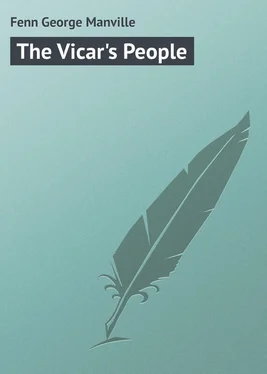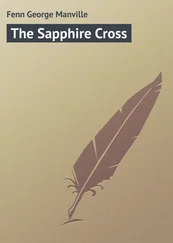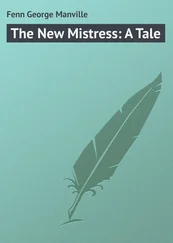George Fenn - The Vicar's People
Здесь есть возможность читать онлайн «George Fenn - The Vicar's People» — ознакомительный отрывок электронной книги совершенно бесплатно, а после прочтения отрывка купить полную версию. В некоторых случаях можно слушать аудио, скачать через торрент в формате fb2 и присутствует краткое содержание. Издательство: Иностранный паблик, Жанр: foreign_prose, на английском языке. Описание произведения, (предисловие) а так же отзывы посетителей доступны на портале библиотеки ЛибКат.
- Название:The Vicar's People
- Автор:
- Издательство:Иностранный паблик
- Жанр:
- Год:неизвестен
- ISBN:нет данных
- Рейтинг книги:5 / 5. Голосов: 1
-
Избранное:Добавить в избранное
- Отзывы:
-
Ваша оценка:
- 100
- 1
- 2
- 3
- 4
- 5
The Vicar's People: краткое содержание, описание и аннотация
Предлагаем к чтению аннотацию, описание, краткое содержание или предисловие (зависит от того, что написал сам автор книги «The Vicar's People»). Если вы не нашли необходимую информацию о книге — напишите в комментариях, мы постараемся отыскать её.
The Vicar's People — читать онлайн ознакомительный отрывок
Ниже представлен текст книги, разбитый по страницам. Система сохранения места последней прочитанной страницы, позволяет с удобством читать онлайн бесплатно книгу «The Vicar's People», без необходимости каждый раз заново искать на чём Вы остановились. Поставьте закладку, и сможете в любой момент перейти на страницу, на которой закончили чтение.
Интервал:
Закладка:
Fenn George Manville
The Vicar's People
Chapter One
Penwynn, Banker
“H’m! ah! yes! of course! ‘Clever young engineer – thoroughly scientific – may be worth your while.’ Geoffrey Trethick! Cornishman by descent, of course.”
“It sounds like a Cornishman, papa.”
“Yes, my dear, Rundell and Sharp say they have sent me a paragon. Only another adventurer.”
“Poor fellow?” said Rhoda Penwynn, in a low whisper.
“What’s that?” said the first speaker, looking up sharply from his letters to where his daughter sat at the head of his handsomely-furnished breakfast-table.
“I only said, ‘Poor fellow!’ papa,” and the girl flushed slightly as she met the quick, stern look directed at her.
“And why, pray?”
“Because it seems so sad for a young man to come down here from London, full of hopefulness and ambition, eager to succeed, and then to find his hopes wrecked in these wretched mining speculations – just as our unhappy fishing-boats, and the great ships, are dashed to pieces on our rocky shored.”
Mr Lionel Penwynn, banker of Carnac, took the gold-rimmed double eye-glass off the bridge of his handsome aquiline nose, leaned back in his chair, drew himself up, and stared at his daughter.
She was worth it, for it would have been hard to find a brighter or more animated face in West Cornwall. Her father’s handsome features, high forehead, dark eyes, and well-cut mouth and chin were all there, but softened, so that where there was eagerness and vigour in the one, the other was all delicacy and grace, and as Rhoda gazed at the gathering cloud in her father’s face the colour in her cheeks deepened.
“Wretched mining speculations – unhappy boats! They find you this handsomely-furnished house, carriages and servants, and horses,” said Mr Penwynn, sharply.
“Oh, yes, papa,” said the girl; “but sometimes when I know the troubles of the people here I feel as if I would rather – ”
“Live in a cottage, and be poor, and play the fool,” exclaimed Mr Penwynn, angrily. “Yes, of course. Very sweet, and sentimental, and nice, to talk about, but it won’t do in practice. There, don’t look like that,” he continued, forcing a smile to hide his annoyance. “Give me another cup of coffee, my dear.”
Rhoda took and filled his cup, and then carried it to him herself, passing her hand over his forehead, and bending down to kiss it afterwards, when he caught her in his arms, and kissed her very affectionately.
“That’s better,” he said, as his child resumed her seat, “but you make me angry when you are so foolish, my dear. You don’t know the value of money and position. Position is a great thing, Rhoda, though you don’t appreciate it. You don’t understand what it is for a man to have been twice mayor of the borough, even if it is small.”
“Oh, yes, I do, papa; and it is very nice to be able to help others,” said Rhoda, sadly.
“Yes, yes, of course, my dear; but you give away too much. I would rather see you fonder of dress and jewellery. People should help themselves.”
“But some are so unfortunate, papa, and – ”
“They blame me for it, of course. Now, once for all, Rhoda, you must not listen to this idle chatter. They come to me and borrow money on their boats, or nets, or fish, or their expectations. I tell them, and Mr Tregenna, who draws up the agreements, fully explains to them, the terms upon which they have the money, which they need not take unless they like, and then when they fail to pay, the boat or fish, or whatever it may be, has to be sold. I never took advantage of any of them in my life. On the contrary,” he continued, assuming an ill-used, martyred air, “I have been a great benefactor to the place, and the good opinion of the people is really important to a man in my position.”
Rhoda looked across at him with rather a piteous face as he went on.
“They would often be unable to make a start if it were not for me; and I always charge them a very moderate rate of interest. You must not do it; Rhoda; you must not indeed. I thought you a girl of too strong sense to listen to all this wretched calumny. You mix too much with the people, and are too ready to believe ill of me.”
“Oh, no, no, papa!” cried the girl, with tears in her eyes, and she rose once more to go to his side, but he motioned her away.
“There, there: that will do, my dear,” he said, forcing a laugh. “You spoil my breakfast. Give me one of those fried soles. There, of course, half cold with our talking. Dear me, dear me, what a lot of grit and sand we foolish people do throw into our daily life.”
He smiled across the table, and poor Rhoda smiled back; then her eyes dropped, and she saw her face so grotesquely reproduced in the highly-polished silver coffee-pot that she felt ready to burst into a hysterical fit of laughing; which she checked, however, as her father chatted on, and read scraps from his other letters, talking pleasantly and well, as his handsome face brightened, and the sun that shone in upon the silver and china upon the fine white damask gave a sparkle to his short, crisp grey hair, though, at the same time, it made plain the powder upon his cleanly-shaven face.
He had so many pleasant things to say on that sunny, spring morning that the breakfast-table was soon as bright as the dappled opalescent sea that sparkled and flashed as it played round the rocky promontory upon which stood the ruins of Wheal Carnac Mine, or lifted the dark hulls of the fishing-luggers moored to the buoys, some of which had their dark cinnamon-hued sails hung out to dry, forming, through the heavily-curtained window, with its boxes of ferns, a charming bit of sea, like some carefully-selected specimen of the painter’s art.
Rhoda had forgotten the little cloud in the present sunshine, when, after a preparation of pleasant words, Mr Penwynn suddenly said, —
“Oh! by the way, I did not tell you about Tregenna.”
“About Tregenna, papa?” said Rhoda, whose face suddenly lowered.
“Yes, my dear,” said Mr Penwynn, putting on his glasses and taking up the paper, as he shifted his chair sidewise to the table, “he’s coming here this morning. By the way, Rhoda, you are twenty-one, are you not?”
“Yes, papa, of course, but – ”
“I told Tregenna you were,” he said, quietly, and with an averted face. “He’s thirty-three.”
“I don’t understand you, papa,” said Rhoda, quietly.
“Has Tregenna been attentive to you lately?”
“Oh, yes, papa,” said Rhoda, impatiently; “but what do you mean?”
“Of course he would be,” said Mr Penwynn, as if to himself. “What’s this alarming earthquake in Peru? Ah! they’re always having earthquakes in Peru; but it’s a fine mining country.”
“Papa, you are not paying any attention to what I say,” cried Rhoda. “What do you mean about Mr Tregenna?”
“Oh, nothing, nothing, my dear,” said Mr Penwynn, re-adjusting the gold-rimmed glasses upon his nose. “Some nonsense of his. He declares that he is terribly smitten with you.”
“Papa!”
“And that he can never be happy without you.”
“Papa!”
“And I told him he had better come and talk to you himself.”
“You told him that, papa?” said Rhoda, pushing back her chair.
“To be sure, my dear,” said Mr Penwynn, rustling the newspaper in the most unruffled way. “Of course it is all nonsense.”
“Nonsense, papa? You know Mr Tregenna is not a man who talks nonsense.”
“Well, perhaps not, my dear. He certainly is a very clever, sensible fellow.”
“Oh!” ejaculated Rhoda, beneath her breath, as she gazed at the handsome profile before her.
Читать дальшеИнтервал:
Закладка:
Похожие книги на «The Vicar's People»
Представляем Вашему вниманию похожие книги на «The Vicar's People» списком для выбора. Мы отобрали схожую по названию и смыслу литературу в надежде предоставить читателям больше вариантов отыскать новые, интересные, ещё непрочитанные произведения.
Обсуждение, отзывы о книге «The Vicar's People» и просто собственные мнения читателей. Оставьте ваши комментарии, напишите, что Вы думаете о произведении, его смысле или главных героях. Укажите что конкретно понравилось, а что нет, и почему Вы так считаете.












